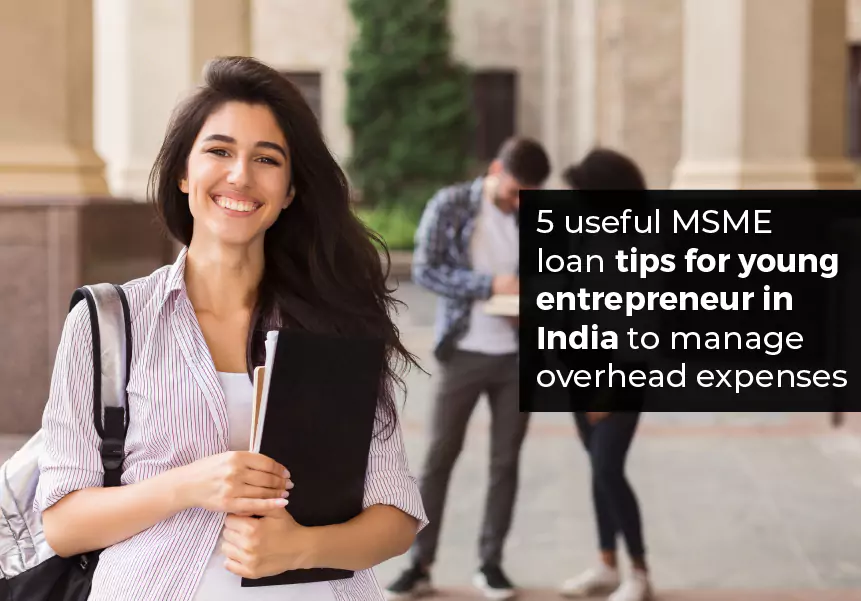
India has well established itself as a growing market in the world attracting investors from several countries. India holds an immense part of this growth in the micro, small and medium enterprises (MSMEs) sector. The MSME sector contributes about 40% of the total GDP and remains an important source of employment. MSMEs sector is considered the backbone of the economic growth in India. These enterprises contribute significantly to the growth and development of the country via innovation.
What is an MSME loan?
An MSME loan is a type of business loan that is offered to micro, small, and medium enterprises for establishing a business, expanding business, or meeting another business budget. MSME loans are unguaranteed and availing them is often a trouble-free process. However, you must fulfill some specific eligibility criteria to access this type of loan. The government of India and RBI defined the MSME loans as “loans for business enterprises for support in terms of finance, infrastructure, and another improvement in your business.”
Financial institutions provide these loans under various government schemes like Credit Guarantee Fund Trust for Micro and Small Enterprises (CGTMSE). This was started by the Government of India, Ministry of MSME, and SIDBI to facilitate the flow of credit to the MSME sector without the need for security requirements of land or property ownership against loans. Under this loan scheme the lender should:
• Give importance to the consequences of project viability, and
• Secure the credit truly on the key security of the assets financed.
Businesses must fulfill these specific eligibility criteria mentioned under the schemes to avail the benefits offered by an MSME loan.
What are the features of an MSME Loan?
•Accessibility
An MSME loan is easy to avail for startup business capital, capital for supporting an already established business, or funds for business expansion and the entire process is hassle-free. Documentation requirement is minimal, and the loan amount is approved quickly.
•Reduced Interest Rates
MSME loans interest rates are less, which makes it a trendy financial product.
•Collateral-free loans
MSME loans are collateral-free, meaning you don’t need to submit the security requirement of land or property ownership against loans to approve it. MSME loans are designed to help small businesses and uplift their productivity, hence they do not require collateral to be eligible for it. This makes MSME loans an excellent source of funds.
•Flexibility
MSME loans are mostly used for short-term loan requirements by businesses. It is flexible which means you can manage the cash flow pattern productively and allocate available expenses accordingly as there is no long-term commitment.
•Importance of micro-small-and-medium enterprise (MSME ) loan
The Indian micro-small-and-medium enterprise (MSME) sector not only contributes a hefty part of the nation’s economy but also contributes a significant part of the population and supports millions of households.
MSME loans are considered a catch-all term for the several modes of financing extended to this sector by both public and private lenders. These loans are a primary ingredient in maintaining the MSME ecosystem high and running since small businesses frequently run on finite resources and liquidity. Different schemes of financing provide small businesses entrepreneurs access to the funds they require for running their operations smoothly, and also for business improvement and expansion.
However, approaching the MSME loans process has always been a problem for most small businesses in India. This is mainly because of risk aversion on traditional lenders’ part such as banks and the key security requirement of land or property ownership against loans. This scenario is changing nowadays, with the emergence of new-age lenders who serve the needs of this segment by offering customized customer service, using digitization for a quick loan, and utilizing data science and machine learning technology for credit underwriting and risk evaluation.
While the need is huge many small business owners have more convenience today to avail faster credit, even without the security requirement of land or property ownership against loans.
Here are some tips that will help you get your MSME Loan.
1. Confirm your eligibility
It’s is very important to check whether your eligibility criteria meet for a loan before you put in your application. This is because multiple inquiries made within a short interval of time can end up dropping down your credit score, even if the loans get approved.
Each time you apply for a loan, the lender checks your credit report from the credit bureaus and it is marked as a red flag if too many lenders are accessing your credit at the same time.
Before applying for a loan, first, check out the lender’s website for eligibility criteria or contact them to assist you with the loan approval.
Each lender will have different standard criteria such as specific sectors your business must operate within; how long your business has been in operation; where your business is located; GST returns; how high the business credit score is, etc. Once you have fulfilled the basic eligibility requirements, you should apply for loans from two or three lenders selectively.
2. Keep the Documentation Ready
Lenders will ask for a list of necessary documents before they approve a loan decision. Different lenders will have different requirements when it comes to document approval, they will need personal and business identification and financial records documents. The following set of documents that you are required for loan approval:
• Personal Identification (KYC) – PAN, Aadhaar, Passport, Voter’s ID, Driver’s License documents that are required to confirm your identification and address proof.
•Business Identification – Business PAN is usually an important requirement. Other forms of business identification include registrations such as Shops and Establishment Certificate, Factory Registration Certificate, and Small Scale Industries Licence (SSI).
•Udyam Registration Certificate – all MSMEs required a unique government-issued registration number, issued by the Ministry of MSME. Udyam registration is free online available.
•Special Sector-based Licenses – Depending on your business sector, you have to submit some specialized licenses that sanction your business to operate and confirm that you conform with local and national laws terms of responsible use of materials and maintaining necessary standards.
These licenses can include:
1. Pollution Control No Objection Certificate (NOC).
2. Forest Department Certificate.
3. Food Safety and Standards Authority of India (FSSAI) Certificate for food manufacturing, or Food, Safety, Drug Administration (FSDA) Certificate.
4. Income Tax Returns (ITR) and Goods and Services Tax (GST) Returns
5. Business and Personal Bank Statements – Bank statements are important to evaluate your current and general cash flow patterns which will impact your loan approval, loan tenor, and interest rates.
3. Know your Loan Purpose
Before you apply for a loan, it’s important to understand how you will use the issued loan amount for your business. You should carefully plan out the expenses and the timeline for the financing. Most lenders will offer working capital loans for a wide range of business needs such as expenses of day-to-day operations, however, it is important to plan and evaluate your expected expenses before getting an MSME loan.
4. Limit the loan to your business need
It is important to know the amount of loan you need to manage your business requirement. Having access to a loan doesn;t mean that you need to take the entire amount available if it cannot be put to good use. A high loan comes with additional EMI burden so it is important to be prudent.
5. Have a repayment plan
Before you enter into a loan agreement, you must have a repayment plan in place. Every loan comes with an EMI repayment liability. You need to take into account your current business expenses and take a loan that can be repaid comfortably. You can decide your tenure to keep the EMI affordable. Never delay or default on your EMI as it can dent your credit score.
Conclusion
MSME loans are an excellent tool to help small business entrepreneurs fund their business budgets. By doing your due diligence in selecting the right lender and checking out your eligibility criteria and documentation requirements, you can minimize unnecessary delays and enhance your chances for loan approval.
Planning to evaluate the loan amount that you need and how you are going to allocate it, as well as having a repayment plan, will help you make impeccable use of the funds to get the perfect outcomes for your business.
LoanTap has tied up with Bank of Maharashtra to offer MSME loans up to Rs 2.5 lakhs at affordable interest rates that can be repaid over 36 months. These loans are collateral free and you can get the disbursement of the loan within 24-36 hours. To know more about LoanTap’s MSME loan scheme, you can visit https://loantap.in/ and we will be glad to assist you.








